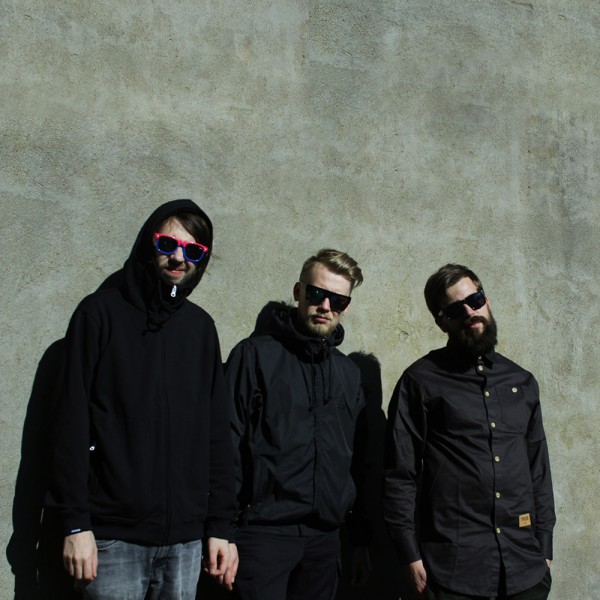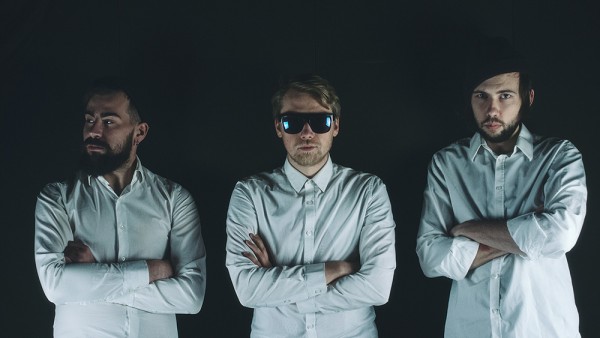“To be artist is already a political statement.”
Victor Volcovich (electronics and percussion), Evgenii Bugaev (drums) and Anton Chizhenok (visuals) are the Saint-Petersburg based art collective Oligarkh. On 24th of August they will make their second appearance in Germany during the Pop-Kultur Festival. In the run-up they were kind enough to produce a little summer mix as well as answer a few of our questions…
Love the mix. Could you tell us a bit about the tracks you chose and the sequence?
Victor Volcovich: Usually we do such music tapes a couple of times a year, but this is the first time we publish it along with a video-mashup. The music always features a compilation of demos, outtakes and unreleased experimental pieces – some of them become part of our live shows, some not.
This time we took samples from a wide range of russian, soviet and post-soviet music: from example music by the experimental Dmitri Pokrovsky Ensemble, our favorite local rock anthem “Romantic Funk” by Sinya Ptiza, the military choral song “Kalinka” and the track “Kostroma” by Ivan Kupala, a real russian deep forest copycat, who mixed artisan ethnic motives with house beats.
You’re based in Russia… so we’re intrigued to know how different the music and art scene is, compared to Germany, the USA or England?
Anton Chizhenok: There is no such thing as a big Russian music scene, but a lot of small local communities around clubs, promoters and labels. Every community has their own leaders, stories, rules and ways of evolve. Some of them like new rap (cloud-rap, grime, etc.) work super well and they are having a huge audience, concerts for thousands of people and some even advertising contracts. But it’s still our inner story, that doesn’t go public out of Russian speaking fandom.
I think that the main difference is the lack of worldwide media for us or music export organization that can help to tour abroad. Every successful band outside of Russia is an exception. So, don’t believe headlines like ‘Russians are coming!’. They aren’t.
Victor Volcovich: The Russian scene works pretty hard to cope with all the problems coming its way. Today with internet communication we grow much faster and become more noticeable. I hope, soon you will not have to ask questions like this anymore.
Our scene is full of talented artists as well as shitty artists like any other, but it’s not that marketable like in US or UK, because it doesn’t get that much attention.
Following on from this… does it matter do you feel your music is received differently in different countries?
Anton Chizhenok: For listeners with different background it might sound and look very different. But Oligarkh works on a couple of different levels.
First it is a groovy loud EDM show with heavy bass, blinding light and freaky pictures on the screen. On the second level it is a post-modern collage of references, links and meanings. That’s for people of former USSR countries who probably recognize pieces from lullabies, tunes from old cartoons or words from a novel by Gogol. The main idea is to mix highbrow and lowbrow, folk and rave, culture and fun.
 What’s the St. Petersburg scene like and how important is it for the creation of your art? Or to put it another way… could Oligarkh also exist outside Russia?
What’s the St. Petersburg scene like and how important is it for the creation of your art? Or to put it another way… could Oligarkh also exist outside Russia?
Anton Chizhenok: I don’t think that our band would be the same in another country and time. Modern Russia is quite an interesting subject for artists to explore.
Victor Volcovich: Russians don’t give a shit about artists until the state is criticised, but also need them to understand itself. Russia is always in on the edge situations, the combination of opposite things — about climate from -40 to +40, about punch in a face and kisses, about lough and cry, about degradation and dreams of space traveling. That’s why Oligarkh won’t be the same if it were created in another place and situation.
You’re going to play on the 24th of August at Alte Kantine in the Pop-Kultur-Festival. This will be the first time you publicly perform the songs from the new EP – how does it relate to the two earlier albums?
Victor Volcovich: Not exactly. Our last EP “Vstan i Idi” was released in February 2017.
It is next step in our story. Tracks are focused more on rave. But we will bring some new stuff to Berlin this time.
Your “Summer Mix” for Pop-Kultur and Kaput is accompanied by a joyful mix of video images – does this stylistically fit the videos we’ll see at Alte Kantine?
Anton Chizhenok: Yes, I used the same technique as for our live sets, dig the similar sources to find the excerpts I need. Some parts of this mix were already played in our show.
I wanted this mix to be like an introduction or invitation to our gig at Pop-Kultur.
 You wrote something really interesting to me:
You wrote something really interesting to me:
“We started using this technique since the first gig to make project more spectacular and take audience a bit deeper into our work, to create some Gesamtkunst. We were trying to construct a hallucination of modern Russia. That’s why it’s so fragmented. The images of historic characters, fairy tales, memories stand side by side with modern day reality, media or advertising in our mind. To express this idea I pick recognisable pieces and take them out of context, put into some new situation and collide them with each other. Like a collage where parts brought together have new meaning. Isn’t it what they call ‘post-modern’?)”
Your phrase „Hallucination of modern Russia“ intrigued me and makes me ask: What is it that typifies „modern Russia“ for you?
And what’s the purpose of hallucinations in that context?
Anton Chizhenok: “Modern Russia” is a country of uncertainty, where any object or notion can be turned upside down in seconds just to reach new political goals.
I use this word for immersion into flow of images, sounds, memories, propaganda, history and myths that lives in the head of an average modern Russian men. It’s the inside of this mind turned into a live show.
Also I would be interested to understand the importance of Russian history and its fairy tales for Russian artists. Do they help people to understand and diagnose their society’s problems? Do they inform wider artistic and sociopolitical thinking?
Anton Chizhenok: One of Russia’s famous writers once said that “Russia has unpredictable past”. We often change our mind about our history, the role of state and people in it, reasons and aftermaths of events. But one of the most popular ideas about our history is the repetition of heroes and situations. People are looking for role models to explain a contemporary state. So, yes — understanding history and myths is the key to the future of this country.
Does art has to be political in 2017?
Victor Volcovich: To be artist is already a political statement.
Oligarkh gonna perform at Alte Kantine on 24th of August as part of the Pop-Kultur-Festival.
Tickets are available here.














